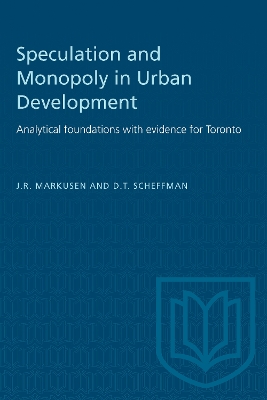The recent rapid rise in land and housing prices in Canadian cities has generated much public concern. It is widely supposed that prices have been inflated by monopolistic developers, an assumption that has never been adequately tested. This study evolves a model of the land development process which includes a new theory of land pricing giving special emphases to market structure, speculation, and taxation. It then applies the model to the first fully documented examination of the Toronto land market, presenting specific original data on ownership and land assembly. The history of the conversion of farmland to residential use in four recent Toronto subdivisions permits a close look at the activities and profits of speculative middlemen and at the length of time developers buy land prior to subdividing.
The results indicate that Toronto real estate is not controlled by a few large developers, that ownership concentration is too low to imply market power even if all companies with overlapping corporate control are treated as a single firm. The authors suggest that rising prices have been caused by unforeseen increase in demand, shortages of municipally provided trunk service capacity, especially sewers, and frequent municipal reluctance to grant subdivision approvals.
The book concludes with a general consideration of the role of government in land development and a number of specific policy recommendations concerning the subdivision approval process, the Ontario Land Speculation Tax, and public land banking. This study will be of great interest to urban geographers and economists, to urban planners and policy-makers, and to representatives of development corporations and urban reform groups.
- ISBN10 0802033482
- ISBN13 9780802033482
- Publish Date 15 December 1977
- Publish Status Active
- Out of Print 13 May 1999
- Publish Country CA
- Imprint University of Toronto Press
- Format Paperback (US Trade)
- Pages 176
- Language English
